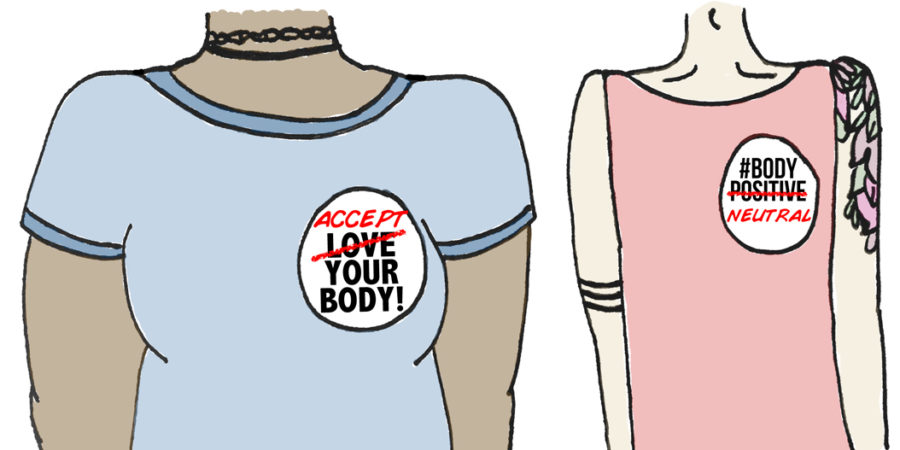As I took my seat in the waiting room at Pitt’s Student Health Center, I noticed a basket holding an assortment of buttons. I began sifting through and saw the same motto emblazoned in bold letters on many of them: “Love your body!”
It was the middle of National Association of Anorexia Nervosa and Associated Disorders Week at the end of February — a five-day period of awareness events about the eating disorder open to the public — so the buttons fit the day, but this sort of body positive rhetoric has started popping up everywhere. With actresses on magazine covers citing the importance of positivity for personal health, graffiti on the walls of bathroom stalls throwing their support behind it and stickers across laptops loudly spreading word about the movement, the pressure to love your body can feel overwhelming. I know I am not the only one who must feel as if this statement is hinting that it is easy for everyone to just decide to love their bodies.
As someone that has a past with eating disorders and body dysmorphia from elementary school and into high school, disordered thinking about body-related issues is something that I had to deal with constantly. These thoughts would intrude upon every aspect of my day — whether it was while brushing my teeth in the morning or having lunch or at a social event — and made me feel like my body was an obstacle to living a normal life. Even now, I realize how difficult it will be for me to ever get to the point of completely loving myself.
For myself and others with a history of eating disorders or body dysmorphia, this sort of unconditional love that body positivity promotes won’t come easily. To go from having deep-seated self-image issues to making the leap across the board to not only accepting your body, but loving it is a hurdle that while admirable, may not always be attainable.
According to feminist author Autumn Whitefield-Madrano, body positivity adds another layer of constraints on women. “My problem with body love, beside the fact that it’s a high standard, is it’s asking women to regulate their emotions, not just their bodies,” she told New York Magazine in an interview March 1.
I am in complete support and very passionate about the self-love and body acceptance movement that is underway, but I believe it is more effective to work toward “body acceptance” and neutrality rather than “body positivity.”
Body neutrality — the idea of accepting your body as it is right now — is a new concept being pushed by many psychologists and body activists as a moderate approach to self-love. If women aim for nothing less than total love for every aspect of their bodies, falling short of that can make them feel worse than they did before.
Joan Chrisler, professor of psychology at Connecticut College, points out that love — even self-love — often carries with it expectations of perfection that are easy to disappoint, especially with regards to your own body.
“We have this notion of love that is connected to perfectionism — the image that we should be in bliss all the time is so strong in our culture,” she said to New York Magazine in an interview.
Body love is being able to see all your imperfections as perfect, and being able to unconditionally love your body in its current state, but body neutrality is the stage in-between — the stepping stone off body hatred that allows you to become more aware of your personal feelings and understanding and lessening your negative self-thoughts.
Body neutrality is looking at yourself in the mirror and maybe not liking how your thighs look in the shorts you are wearing, but allowing that to be a passing thought. It is going through the day wearing those shorts, pushing that idea to the back of your mind and realizing that it doesn’t matter.
It can be going to a restaurant with friends and ordering a cheeseburger, because that’s what you’re craving — or ordering a salad because that’s what you’re craving. It is going to the gym because you want to feel healthier and get your blood pumping, not because you desperately feel the need to change your body.
It’s much easier to lessen negative thoughts about your body or your self-image by focusing on acceptance, rather than a feeling of obligation. And according to the Cleveland Clinic, a nonprofit academic medical center, self-acceptance is one of the first steps to getting to self-love.
It is important for women to realize that their worth exists beyond their bodies, that they should not value themselves by what their bodies do or do not look like. And while both body-positivity and body-neutral movements do their best to get to this point, for some women it’s simply easier to take a less pressured approach to get there.
I’m sure at some point in every woman’s life, she has had issues with her body or has wanted to change something, but they shouldn’t feel the pressure to get to total body acceptance right away. And of course, this sentiment isn’t exclusive to women — men too can have problems with body image, and can benefit just as much from a body-neutral approach to self-acceptance. The decision to love oneself won’t come with the snap of your fingers. For me, I have to remind myself every morning to vow that I will work to accept myself as I am and take it day by day.
Getting to body love is a long process. It’s okay to work toward body acceptance first.
Erica primarily writes about social issues and mental health for The Pitt News.
Write to Erica at [email protected].



